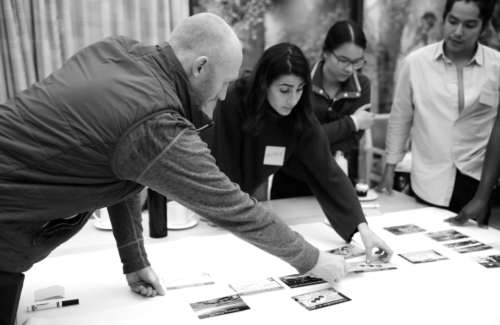Considering the dull, repetitive way in which the threats of climate change are often presented in academic settings, it should be no surprise that many students are tired and disillusioned by the climate change crisis. Professors and textbooks often portray climate change as either unfathomably large or highly complex, and this can drain our motivation to address it, effectively leaving us paralyzed. It can be easy to think, as I have sometimes done, that it is already far too late for us to escape climate change’s most daunting effects. However, there might be a way of educating people about this disheartening yet incredibly urgent topic without engendering that numbing feeling of despair as a byproduct—and it seems almost too easy.
Too many social media-driven climate mitigation strategies focus on individual rather than collective action; surely everyone has been reminded countless times of the need to turn off unnecessary lights, reduce the length of showers, and recycle our waste. While such measures are certainly important, their impact is simply not large enough, considering the magnitude of the crisis. Other times our calls for action tend to gravitate towards two central bodies who harbor the power to enforce solutions that can help halt or reverse the planet’s warming: politicians and scientists. We lose sight of the fact that if a solution is going to be effective, it requires everyone’s (including our civilians’) participation.
Mauro Morabito, the head Teaching Fellow of GenEd 1094: “Confronting Climate Change: A Foundation in Science, Technology and Policy,” facilitated a Climate Fresk workshop on September 26th and 29th in Mather House with the intention of addressing this all-too-common issue of students feeling out of touch with climate change. The movement aims to equip participants with knowledge of the fundamental science underlying climate change, a feeling of empowerment, and a desire to take action against it. Since the organization’s founding in 2015, over one million participants in 130 countries have enrolled in Climate Fresk workshops, hoping to enhance their understanding of climate change’s causes and consequences and subsequently discuss potential mitigation strategies.
Fifteen participants, including myself, were divided between two tables equipped with colored markers and post-it notes reminiscent of kindergarten art activities. The workshop comprised three stages: a construction of a “fresco” to display climate change’s timeline (hence the organization’s name), a verbal reflection, and a session to brainstorm tangible solutions. The assembly of the fresco allowed participants to break climate change into a more digestible topic, by illustrating its causes and consequences. My group’s fresco resembled a spider diagram, with interlocking colorful arrows connecting many factors of climate change together.
Seeing the causes of climate change in front of us broke down this complex issue into more digestible pieces of information. People were able to clarify otherwise cryptic scientific concepts such as ocean acidification and radiative forcing to unfamiliar ears. Our different academic backgrounds were an asset: I was able to use knowledge from Life Sciences 1a to explain how carbonic acid dissociation leads to a drop in the ocean’s pH, while a participant working in the medical industry outlined the correlation between organismic habitat loss and human health.
By the time the climate frescos were completed and admired, a true sense of community had permeated the room. It was clear to me that the group of strangers that had nervously entered a couple of hours ago had managed to find commonality in their shared concern for the planet.
During the second stage of Climate Fresk, we sat in a circle and had the chance to discuss our emotional reactions to the previous activity. People shared their fears regarding the future of the Earth, personal stories of migration due to precarious climate situations, and doubts about wanting to have children forced to bear the burden of our choices.
The third and final stage of Climate Fresk consisted of an open discussion about potential solutions we could adopt to reach the goal of the Intergovernmental Panel on Climate Change (IPCC) from the 2015 Paris Agreement: restricting the global temperature rise to two degrees Celsius. The workshop’s facilitator, Morabito, explained that one way to achieve this would be to reduce everyone’s carbon emissions to 2 gigatonnes a year. Currently, Americans emit 16 gigatonnes of carbon a year on average.
In speculating possible methods to approach this goal, we discussed solutions like clean energy production, reduced meat consumption, and engineering endeavors like manually filling the atmosphere with cooling aerosols. “[I wanted to] reinforce my knowledge about climate change in a setting other than the classroom,” said Oliver Song ’27. Like many of the other participants, he was “very satisfied” with what he got out of the experience. “[The] opportunity to communicate with others with the workshop’s content contributed very positively [to my experience],” Song said.
Climate Fresk portrayed the dimensions of climate change in a way that I had never experienced. By visually mapping out its catalysts as well as understanding the immediate consequences, I gained an understanding of the looming challenge in a way that actually seemed possible. If there is ever an opportunity for you to complete Climate Fresk, take it—it is an experience you will not regret.
Ana-Mara Leppink ’27 (aleppink@college.harvard.edu) indulged in too many of the vegan cookies that were served at the workshop.

